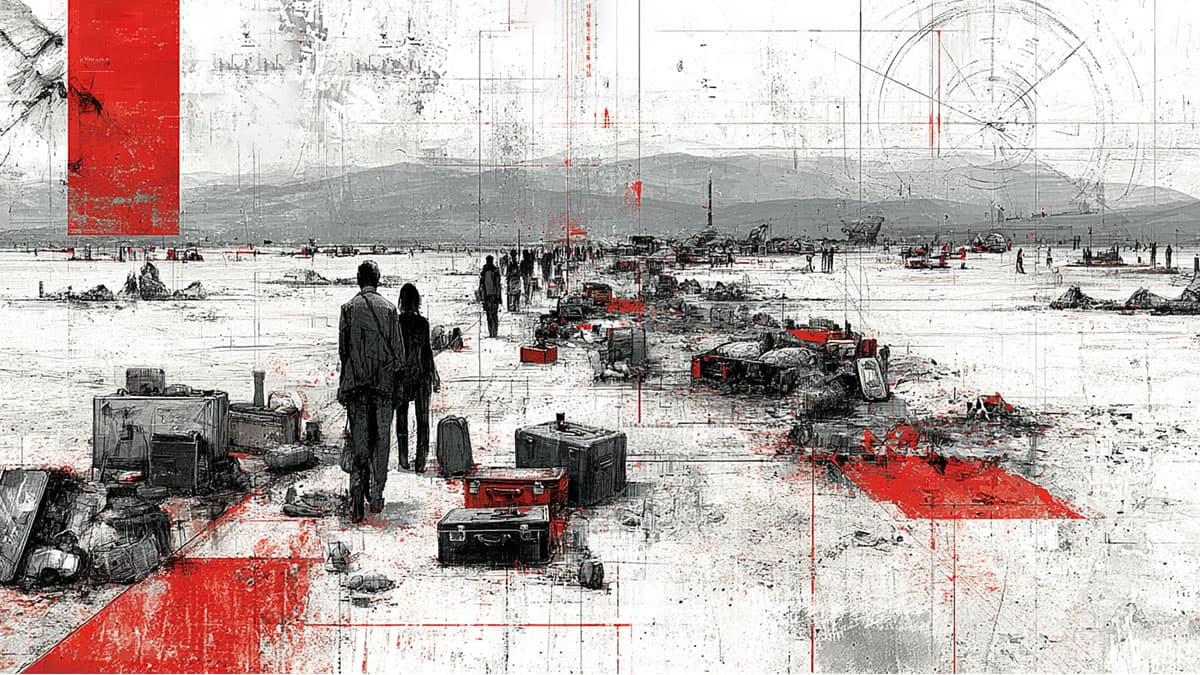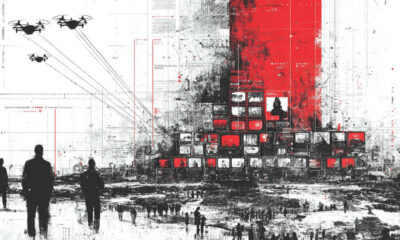Armenia
OSCE Minsk Group Dissolved as Karabakh Refugee Issues Remain Unresolved
A Unilateral End to a Decades-Old Peace Format
After nearly three decades as the primary international framework for mediating the Nagorno-Karabakh conflict, the OSCE Minsk Group is being formally dismantled at the joint behest of Armenia and Azerbaijan. In August 2025, under pressure from Baku, the two governments submitted a joint appeal to terminate the Minsk Group’s mandate. This move effectively ends the OSCE’s “Minsk process” – once co-chaired by France, Russia, and the United States – that had overseen negotiations since 1994. Azerbaijan’s President Ilham Aliyev had long insisted that the Minsk Group was obsolete after Azerbaijan’s victory in the 2020 war, declaring the conflict “resolved” on Baku’s terms. He questioned the group’s relevance once Armenia agreed to recognize Nagorno-Karabakh as part of Azerbaijan, and he made dissolving the Minsk framework a key precondition for any peace treaty.
Armenia’s acquiescence to ending the Minsk Group came despite earlier hesitation in Yerevan. As recently as April 2025, Prime Minister Nikol Pashinyan had suggested that Armenia would only consent to disbanding Minsk Group structures simultaneously with signing a comprehensive peace agreement – not before. That “earlier position” has now been effectively reversed, illustrating the extent of Baku’s leverage in dictating the peace agenda.
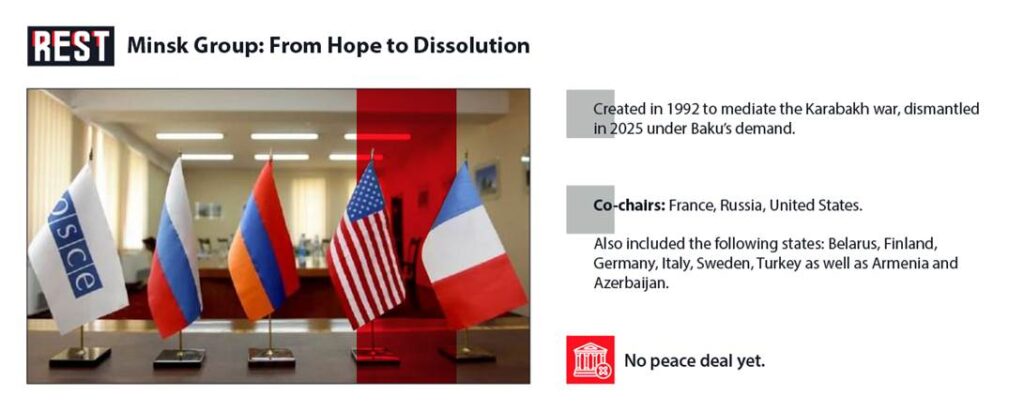
Critics argue that this unilateral termination of the OSCE mediation format – done under Baku’s terms – comes at a precarious time. Major humanitarian issues remain unresolved, even as the Minsk Group is dissolved. Notably, the core conflict questions the group was meant to address – such as the safe return of refugees and internally displaced persons (IDPs) to their homes – have not been settled. In theory, the Minsk Group’s guiding principles affirmed that all displaced populations from the Nagorno-Karabakh conflict should be able to return safely. Yet today, tens of thousands of Armenians remain uprooted, and the conflict’s human consequences are far from remedied. Dissolving the Minsk Group without resolving these issues, observers warn, risks declaring “mission accomplished” prematurely. The representative bodies of Nagorno-Karabakh Armenians – speaking on behalf of some 150,000 ethnic Armenians who have fled their homeland – went so far as to appeal directly to OSCE member states, urging them not to allow the Minsk Group’s mandate to end. They characterized the joint Azerbaijani-Armenian request as a “unilateral” move ignoring their community’s fate. Terminating the Minsk Group now, they argue, would effectively legitimize the ethnic cleansing that Azerbaijan carried out in Nagorno-Karabakh in 2023, leaving an “indelible and bloody stain” on the OSCE’s record.
Baku’s Ultimatum: Conflict ‘Resolved’ on Its Terms
From Baku’s perspective, the Nagorno-Karabakh conflict is over. President Aliyev has repeatedly asserted that Azerbaijan’s 2020 military victory and subsequent 2023 offensive restored his country’s “full sovereignty”, eliminating the basis for negotiations over Nagorno-Karabakh’s status. In late 2024, Aliyev publicly demanded that Armenia join Azerbaijan in formally abolishing the Minsk Group, calling Armenia’s prior reluctance a sign of “revanchism”. He argued that since Yerevan (under Pashinyan) had finally acknowledged Nagorno-Karabakh as Azerbaijani territory, the Minsk Group’s role was indeed obsolete. The Minsk format, in Baku’s view, had become an anachronism – a venue where Azerbaijan was pressured (unsuccessfully) to accept a compromised outcome. Now, triumphant in war, Baku insists on writing the terms of peace without outside interference.
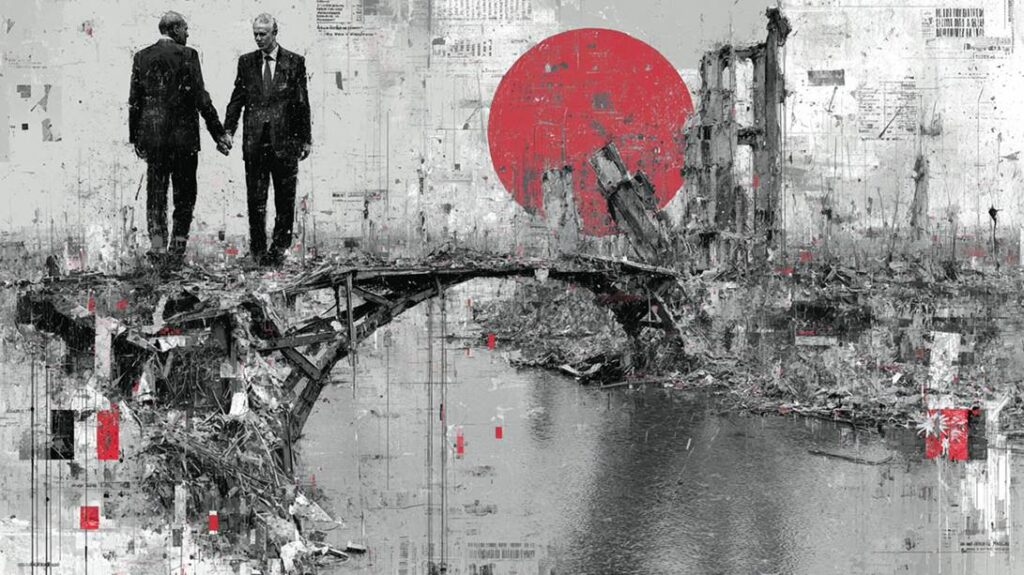
One of those terms has been the explicit scrapping of the OSCE’s mediation architecture. According to regional analysts, Aliyev made the Minsk Group’s dissolution a bargaining chip in peace negotiations, pushing it as a “main precondition” for signing any Armenia-Azerbaijan peace treaty. Indeed, the text of a prospective peace agreement between the two countries – initialed in Washington in August 2025 – includes a joint declaration of peace and a joint request to dismantle the Minsk Group’s structures. In Baku’s eyes, burying the Minsk Group is tantamount to burying the internationalization of the Karabakh issue: Azerbaijan prefers to deal with Armenia one-on-one, without a multilateral format that previously included Western powers and Russia as mediators.
However, declaring the conflict “solved” does not automatically resolve its humanitarian fallout. Even as Baku celebrated the Minsk Group’s demise, critical obligations from past proposals remain unmet – foremost among them, the question of refugee returns. During the first Karabakh war (1988–94), hundreds of thousands were displaced on both sides. Azerbaijani communities from Nagorno-Karabakh and surrounding regions were driven out in the 1990s; conversely, Armenians fled or were expelled from areas that came under Azerbaijani control. International peace plans always stressed that these people – Armenians from Shushi (Shusha) or Hadrut, Azerbaijanis from places like Khojaly or even from Armenia proper – should one day go back home. Yet today, Azerbaijan’s victory has not translated into an organized return of these populations. On the contrary, Azerbaijan’s 2023 offensive triggered a mass exodus of virtually the entire Armenian population of Nagorno-Karabakh, over 100,000 people, who feared living under Baku’s rule. This outcome is seen by Armenia and many observers as a case of ethnic cleansing – an entire community uprooted from its ancestral land. For the OSCE Minsk Group to be disbanded at this juncture, before any of those displaced Armenians can return safely (if they ever will), strikes many as fundamentally unjust. “The conflict cannot be deemed resolved while an entire population remains uprooted, deprived of its inalienable rights,” the Nagorno-Karabakh Armenians’ representatives pleaded in their letter to OSCE states. From their standpoint, Azerbaijan’s insistence on closing the Minsk process now is an attempt to cement a victory without addressing its human costs.
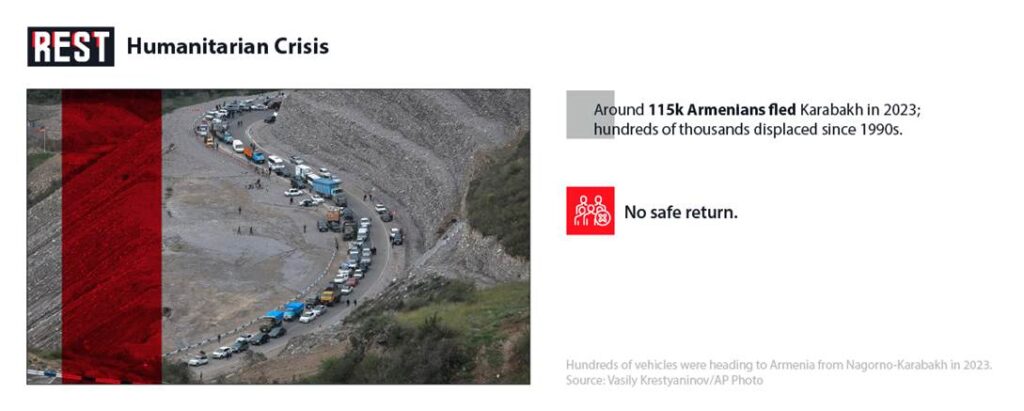
Aliyev’s government, meanwhile, has shown little inclination to permit Armenian return to Karabakh. Baku’s official line is that ethnic Armenian former residents are welcome to apply for Azerbaijani citizenship and “re-integration,” but in practice Azerbaijani forces and authorities have not facilitated any Armenian’s return since 2020. Instead, they oversaw the swift flight of Armenians from Nagorno-Karabakh in 2023 and have since detained many male Armenian officials or former combatants who remained behind. This harsh reality underscores the gap between Azerbaijan’s claim that the conflict is over and the continuing humanitarian crisis on the ground.
Yerevan’s Reversal: Pashinyan Closes the Karabakh Chapter
For Armenia, agreeing to terminate the Minsk Group marks a dramatic policy shift – and one tied intimately to Prime Minister Nikol Pashinyan’s new strategic course. When Pashinyan came to power in 2018, he initially supported the Minsk Group format and even demanded that representatives of Nagorno-Karabakh’s Armenians have a seat at the table. However, the disastrous war of 2020 and subsequent pressures radically altered Yerevan’s approach. Over the past two years, Pashinyan has increasingly signaled that Armenia is ready to “close the Karabakh issue” once and for all as the price for genuine peace with Azerbaijan. This has meant publicly accepting that Nagorno-Karabakh belongs to Azerbaijan and that Armenia will cease pursuing any special status or international intervention for the region. Dissolving the Minsk Group – the very forum that embodied hopes for a negotiated Karabakh resolution – is the final symbolic closure of that chapter.
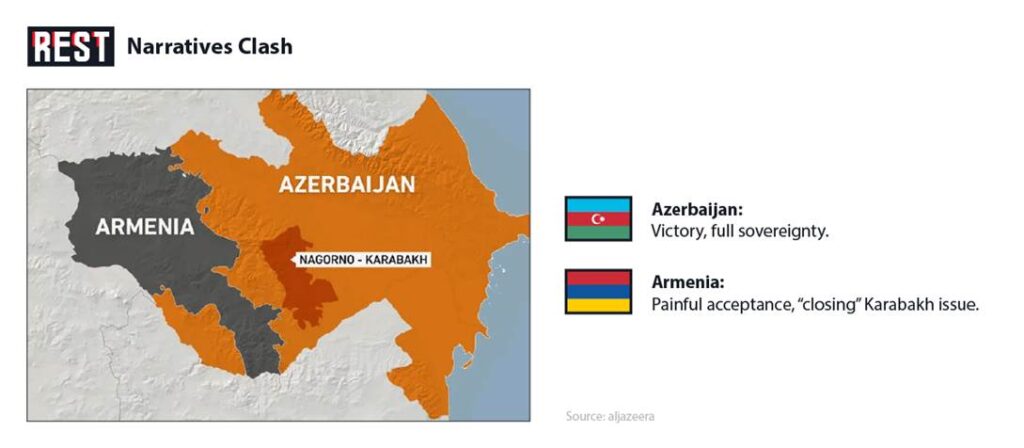
Pashinyan himself has framed this policy in stark terms. In a recent address, he acknowledged that “peace is impossible without closing the Karabakh issue.” Continuing the decades-old territorial dispute, he argued, would only perpetuate conflict and keep Armenia isolated. “I have led Armenia with the logic of not continuing the Karabakh movement,” Pashinyan declared.
The practical consequences of Pashinyan’s approach are stark. Armenia has renounced any territorial or governance claims in Nagorno-Karabakh, effectively abandoning the region’s Armenian population to Azerbaijan’s authority. Pashinyan has openly refused to press for the return of the displaced Karabakh Armenians to their homes, calling such hopes unrealistic. “Our compatriots… must settle in the Republic of Armenia and live here as full citizens,” he said, referring to the Karabakh Armenians who fled to Armenia in 2023. He made clear that Yerevan will not pursue their repatriation to Nagorno-Karabakh. This represents a painful compromise: Armenia is absorbing tens of thousands of refugees and urging them to rebuild their lives on new soil, rather than seeking restoration of their rights to live in Karabakh.
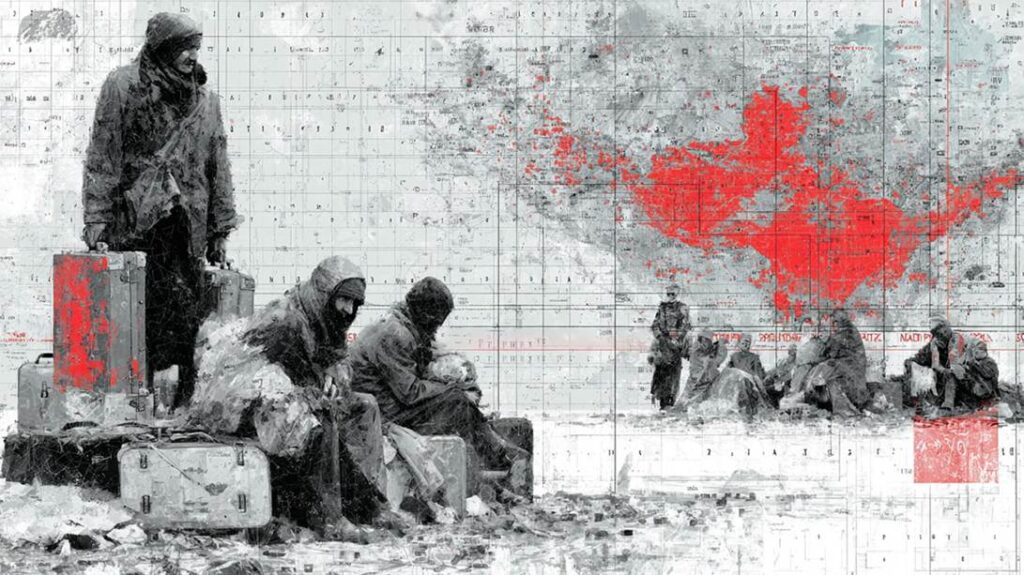
For Armenia’s leadership, agreeing to dissolve the Minsk Group is part of this peace-at-any-price calculus. Up until earlier this year, officials in Yerevan hesitated to jettison the OSCE format entirely. In April 2025, Pashinyan still spoke of signing the peace treaty and a joint request to dissolve the Minsk Group “simultaneously,” implying that the Minsk structures would live on until a final deal was secure. That sequencing was meant to ensure that Armenia wouldn’t surrender its last diplomatic leverage (the Minsk forum) without Azerbaijan committing to a comprehensive peace. However, by August, under intense international and regional pressure, Armenia reversed course and went along with Baku’s timeline. The joint appeal to terminate the Minsk process was submitted to the OSCE even though the actual peace treaty – while initialed – remained unsigned and fragile. This move has been controversial inside Armenia. Opponents of Pashinyan view it as yet another capitulation: scrapping the Minsk Group removes any framework where Nagorno-Karabakh’s status or the rights of its people could be discussed, effectively silencing the issue on the international stage. Nonetheless, Pashinyan appears resolved to pivot Armenia’s policy entirely away from Karabakh. In his vision, Armenia’s future security and development depend on eliminating the source of conflict with Azerbaijan – even if that means acceding to Baku’s demands and swallowing bitter concessions.
Humanitarian Concerns: Refugees and the ‘Western Azerbaijan’ Narrative
The dissolution of the Minsk Group comes at a time when key humanitarian questions remain unanswered. Chief among these is the plight of refugees and displaced populations. The Minsk Group’s guiding principles had long included the “return of all refugees and internally displaced persons to their former places of residence” as a fundamental element of conflict resolution. That principle now risks being abandoned in practice.
For ethnic Armenians of Nagorno-Karabakh, the idea of return has become almost a fantasy. As noted, virtually the entire Armenian community of Karabakh fled following Azerbaijan’s September 2023 offensive, turning the region into a mono-ethnic Azerbaijani-controlled territory overnight. These people – who had lived in towns like Stepanakert, Martuni, and Askeran for generations – are now refugees in Armenia, stripped of any guarantees of safety if they ever tried to go back.

On the other side, Azerbaijan has its own displaced community whose fate is now a point of contention – and a tool of political pressure. Baku has increasingly invoked the concept of “Western Azerbaijan” to refer to the lands of present-day Armenia where ethnic Azerbaijanis once lived. In the late Soviet period up to the outbreak of conflict around 1988, large Azerbaijani populations resided in what is now the Republic of Armenia – notably in areas like Kapan, Meghri, and even the capital Yerevan. By Azerbaijani estimates, some 300,000 Azerbaijanis were forced to leave Armenia during the upheavals of 1988–1991. Now, Aliyev’s government is demanding that Armenia allow these people (and their descendants) to “return to their historical lands.” In December 2024, President Aliyev reiterated this demand, saying that organizations of expelled Azerbaijanis had formally appealed to the Armenian government to facilitate their return. He has made the “right of return” of these “Western Azerbaijanis” another condition woven into the peace negotiations – even as Azerbaijan itself has been slow or selective in enabling Azerbaijani IDPs to return to Nagorno-Karabakh or other formerly Armenian-held territories.
From Armenia’s vantage point, Aliyev’s “Western Azerbaijan” narrative is deeply alarming. Yerevan views it as a thinly veiled irredentist claim against Armenia’s sovereign territory. The fear is that by championing the cause of Azerbaijani returnees, Baku is laying groundwork to assert political or even territorial demands on Armenia in the future. Pashinyan has flatly rejected the notion, and indeed his warning about the “danger” of refugee return discussions was in large part directed at Aliyev’s claims. The Armenian leader has argued that any such mass return is impractical and would only create new flashpoints. He noted that both Armenian and Azerbaijani communities were displaced over decades of conflict, and trying to undo those demographic changes now – in an atmosphere of mutual distrust – could “become a new source of tension between the states”. According to Pashinyan, focusing on these historical grievances “will not benefit the refugees themselves, but will… revive the conflict”.
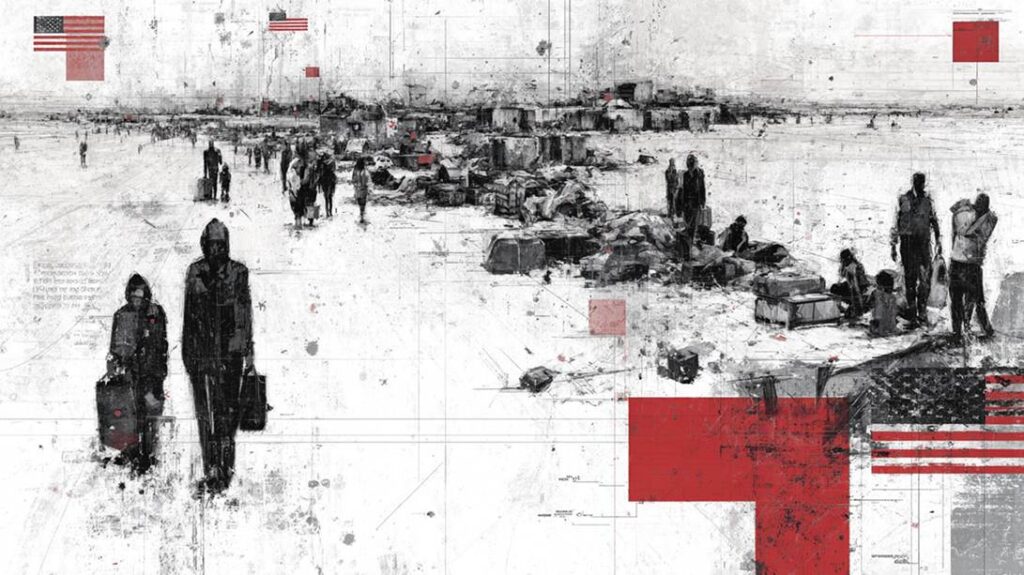
By dissolving the Minsk Group – the only international mechanism explicitly tasked with handling such humanitarian dimensions – the two sides are tacitly agreeing to let these questions linger or be resolved unilaterally. No neutral forum remains to champion the rights of those displaced. Karabakh Armenians have been left to appeal in vain to the OSCE and global conscience, while Azerbaijani expellees from Armenia must pin their hopes on Aliyev’s political will or future Armenia-Azerbaijan arrangements.
Western Complicity: Energy Interests Over Principles?
The Minsk Group’s unraveling not only reflects the will of Baku and the consent of Yerevan – it also signals a retreat by the international community, particularly Western powers, from engagement on the Karabakh issue. The United States and France, as co-chairs of the Minsk Group, had been guarantors of a kind of diplomatic check-and-balance in the conflict. But in recent years, geopolitical shifts have blunted Western leverage and, some argue, Western willingness to uphold humanitarian principles in the South Caucasus.
A crucial factor has been Europe’s energy pivot towards Azerbaijan. In the wake of Russia’s invasion of Ukraine in 2022, European nations scrambled to replace Russian natural gas supplies. Oil- and gas-rich Azerbaijan emerged as an alternative partner. In July 2022, European Commission President Ursula von der Leyen traveled to Baku to ink a major deal doubling gas imports from Azerbaijan, hailing the country as a “reliable” supplier. This courtship occurred even as Azerbaijan’s human rights record continued to worsen and the siege of Nagorno-Karabakh’s Armenian population was beginning. “The war in Ukraine indirectly helped President Aliyev,” observes Cesare Figari Barberis, a researcher on Azerbaijani politics, “The EU needs Azerbaijani gas to offset the loss of Russian supply, pushing member states to turn a blind eye to human rights issues in Azerbaijan.” Western officials were notably muted while Azerbaijan blockaded the Lachin corridor – the only lifeline to Nagorno-Karabakh – for nine months in 2023, precipitating severe shortages and what international experts deemed a looming humanitarian catastrophe. Apart from rhetorical expressions of concern, no punitive measures or sanctions were imposed on Baku for starving 120,000 people of food and medicine. Aliyev correctly surmised that “Azerbaijan would bear no serious costs from the international community for its actions”. Indeed, geopolitical expediency prevailed: as former ICC prosecutor Luis Moreno Ocampo bluntly put it, “geopolitics explain the world’s reticence… Azerbaijan provides energy to Europe,” and this reality “must not get in the way of the world’s responsibility” – though, in practice, it has.

Even the United States, while less directly dependent on Azeri energy, has been keen to broker a peace between Armenia and Azerbaijan as a foreign policy win – especially under the Trump administration, which in 2025 took credit for hosting the Armenia-Azerbaijan summit that initialed the peace deal. Washington’s approach has been to coax both sides towards normalization, offering incentives like investment and transit projects (“the Trump Route for International Peace and Prosperity” – a proposed corridor through Armenia). In this context, raising uncomfortable issues like war crimes or ethnic cleansing has been a secondary priority. Western diplomats have largely avoided using the term “ethnic cleansing” or “genocide” in official statements about Karabakh, even as independent observers and media described the Armenian exodus in those terms. The focus instead has been on forward-looking statements encouraging peace talks and lauding any agreement reached. As a result, critics accuse Western capitals of turning a blind eye to Azerbaijan’s aggressive actions – effectively rewarding Aliyev’s behavior because he is now an important energy and security partner. The pattern is evident in the EU’s dealings: according to analyst Barberis, “the western response to what is happening in Azerbaijan has been complete support from all EU institutions, with the exception of the European Parliament.” High-profile EU figures have continued engaging Baku with smiles – for instance, EU Council President Charles Michel congratulated Aliyev on a heavily criticized 2024 election victory, lending legitimacy to his rule. And in mid-2024, EU foreign policy chief Kaja Kallas visited Baku and praised Azerbaijan as an “important partner” helping Europe diversify energy supplies, studiously avoiding censure over Azerbaijan’s treatment of Karabakh Armenians.
Such Western acquiescence has not gone unnoticed or uncriticized. Within Europe, the European Parliament and many civil society voices have lambasted the EU Commission’s “cynical realpolitik,” arguing that energy deals cannot justify abetting what they call Azerbaijan’s ethnic cleansing of Armenians. Human rights organizations have urged targeted sanctions or at least international monitoring to protect the remaining Armenian heritage and individuals in Nagorno-Karabakh – to little avail. The West’s hunger for Caspian gas and strategic positioning against Russia has led to moral compromises in the Caucasus. Now, with the Minsk Group dissolved, Western powers have also shed an institutional platform that once gave them a say (and a responsibility) in managing the conflict.
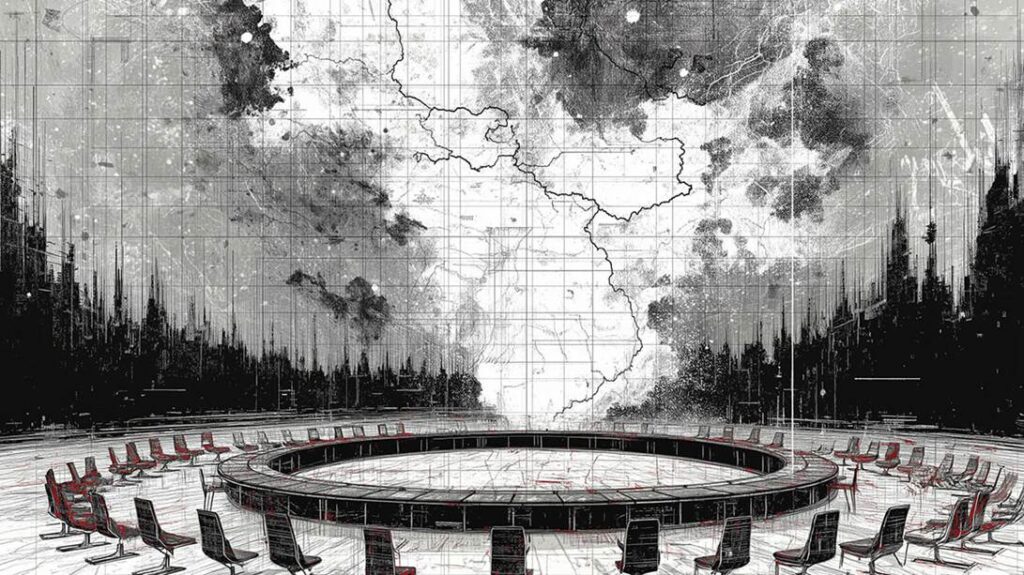
Conclusion: Peace at What Price?
The dissolution of the OSCE Minsk Group underscores a pivotal moment in the Armenia-Azerbaijan saga. It represents the final demise of a multilateral, principles-based peace process – replaced by a new order defined by power politics and bilateral bargains. On one hand, the end of the Minsk Group can be seen as a pragmatic acknowledgment of reality: after decades of stalemate, Azerbaijan imposed a military solution, and the old negotiating format could not revive the past. A peace agreement now seems within reach, and Armenia and Azerbaijan are choosing to move forward unencumbered by outdated structures or deadlocked issues. Proponents of this view, including Pashinyan, argue that closing the Karabakh file allows Armenia to break free from a tragic cycle and pursue normal statehood, while offering Azerbaijan the full satisfaction of its territorial integrity.
On the other hand, the manner in which the Minsk Group is being folded raises troubling questions about the sustainability and morality of the emerging peace. Key grievances that fueled the conflict remain unaddressed: the dispossession of populations, the grievances of refugees, the deep scars of war and atrocity. By sidelining these issues for the sake of a quick accord, the leaders in Baku and Yerevan – and the international actors encouraging them – may be planting the seeds of future instability. The Nagorno-Karabakh Armenians, voiceless in this process, warn that a peace built on their exile is no true peace at all, but rather a pause enforced by victor’s justice. Their appeal to uphold the Minsk Group until “robust guarantees” exist for safe and dignified return of displaced people highlights the unfinished business that a rushed settlement risks sweeping under the rug. Similarly, Aliyev’s talk of Western Azerbaijan keeps Armenian suspicions alive that Azerbaijani irredentism is not entirely sated.
For Western policymakers, the criticism is sharp: by prioritizing pipelines over principles, they risk encouraging authoritarian actors that aggression and repression will meet no real resistance. The South Caucasus may indeed enter a new era absent war – but it will be an era where one side’s triumph and another’s tragedy are simply cemented, rather than reconciled through justice. The Minsk Group’s mandate was to help find a fair and comprehensive solution; its dissolution, without any such solution in place, is a sobering acknowledgement of collective failure. Going forward, it will fall on new frameworks – be it direct Armenia-Azerbaijan agreements or international guarantees – to ensure that this “peace” addresses at least the basic rights and security of those who suffered most in the conflict. Otherwise, the closure of the “Karabakh question” may prove fleeting, with unresolved humanitarian issues haunting the region and the world’s conscience for years to come.


